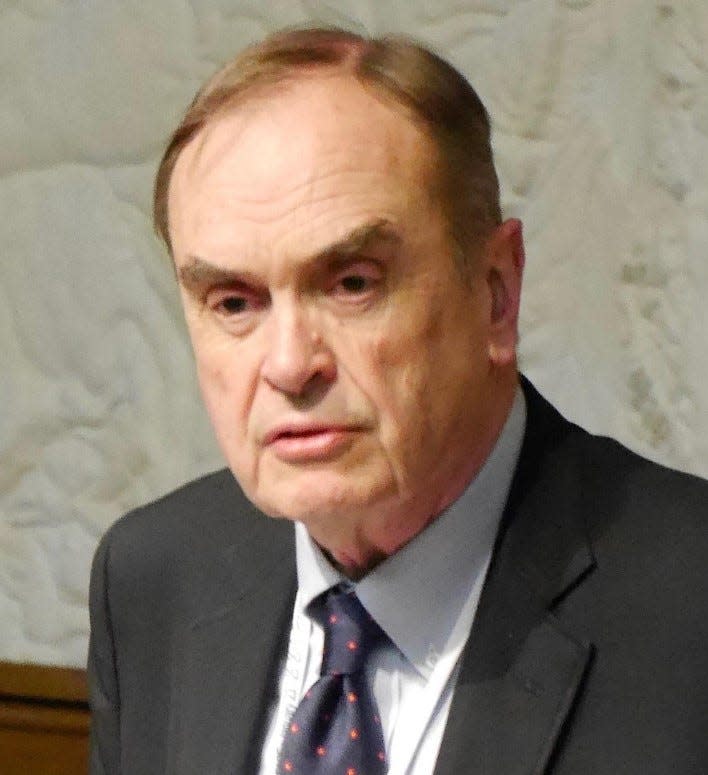Richard Killmer: A David vs. Goliath story
I was at the meeting of the United Nations conference on climate change (called COP for Conference of Parties) in Dubai of the United Arab Emirates (UAE) earlier this month. I watched a David vs. Goliath battle. The fossil fuel industry (processors of oil, gas and coal) was the Goliath and had 2,400 lobbyists at the meeting.
Add to that strength that the president of COP28 was Sultan Al Jaber, the head of the UAE’s state oil company. He had famously said during COP28, “There is no science out there, or no scenario out there, that says the phaseout of fossil fuel is what's going to achieve 1.5.” That threshold in degrees Celsius is the maximum increase in the global temperature since 1880 (the beginning of the Industrial Revolution), that the world can tolerate without facing devastating damage during the 21st century.

An earlier draft of the final statement during COP was seen as watering down the many calls for a phaseout of fossil fuels, which more than 100 nations wanted. It said nations “could” take actions to slash greenhouse gas emissions, including “reducing both consumption and production of fossil fuels” by 2050. But it said nothing about deeply cutting fossil fuel use this decade, and the use of “could” made the action optional.
That draft provoked outrage from many COP28 delegates. John Silk, the minister of natural resources for the Republic of the Marshall Islands said, “The Republic of the Marshall Islands did not come here to sign our death warrant. We will not go silently to our watery graves.”
I have been to several COPs of the UN Framework Convention on Climate Change before. I am a retired Presbyterian minister who believes that people are called by God to take care of the gift of creation. I also have nine grandchildren whom I want to grow up in a beautiful and inhabitable world. I am convinced that the world will be a dangerous place for my grandkids if we keep driving gas-powered cars and burn oil, gas and coal in other ways.
So, I got to watch David beat Goliath. As Sultan Al Jaber moderated, the 197 nations at COP28 agreed to “transition away from fossil fuels in energy systems, in a just, orderly and equitable manner.” It was the first time that phasing down fossil fuels was mentioned in any agreement of any COP in 28 years of international climate negotiations.
Even the Paris Agreement, which has directed the work of the UN Framework Convention on Climate Change, did not include the words “fossil fuels.” Not everyone is thrilled with the wording, but many of us are pleased that the nations of the world are for the first time saying that a transition away from oil, gas and coal will take place.
Manuel Pulger-Vidal, the president of COP20 in 2014, said, “After three decades of U.N. climate negotiations, countries have at last shifted the focus to the polluting fossil fuels driving the climate crisis. This outcome must signal the beginning of the end for the fossil fuel era.”
COP28 took several other actions that were significant. At COP27 in Egypt in 2022, delegates meeting in Dubai agreed to create a Loss and Damage Fund that would compensate vulnerable countries devastated by the climate crisis. Committees worked during the year to come up with a plan including where the money would come from and the process for deciding where the money would go. On the first day of COP28, delegates agreed on the plan and asked nations to contribute to it.
COP28 had successes, but much more work still needs to be done, including by the nations themselves as they phase down the use of fossil fuels. As David Gelles of the New York Times said in an article on Dec. 13, “But sometimes the arc of history can begin to shift with just two little words: like 'fossil fuel.'"
— Rev. Richard Killmer is a retired Presbyterian minister, who lives in East Grand Rapids.
This article originally appeared on The Holland Sentinel: Richard Killmer: A David vs. Goliath story

